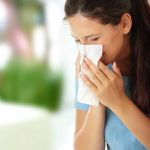 Pollens — the microscopic plant particles that cause seasonal allergies in many people — come from three general types of plants: trees, grasses and weeds. In general, trees pollinate in the late winter/early spring; grasses often overlap the trees at the end of their season and extend late into the summer; and ragweed, the most important of allergenic weeds, starts pollenating in mid-August through September.
Pollens — the microscopic plant particles that cause seasonal allergies in many people — come from three general types of plants: trees, grasses and weeds. In general, trees pollinate in the late winter/early spring; grasses often overlap the trees at the end of their season and extend late into the summer; and ragweed, the most important of allergenic weeds, starts pollenating in mid-August through September.
Tree Pollen Allergies
It is no coincidence that May was selected for the honor of “Allergy and Asthma Awareness Month.” March, April and May are when trees are pollinating in most of the United States (earlier in the south and southwest). If you Google “tree pollen maps,” you will see maps showing tree pollen levels around the U.S.
There are often a couple dozen trees relevant to each part of the country, with some overlap of types. Each tree pollinates for 1 to 2 weeks, and at that time the pollen levels can be quite high, resulting in severe nasal symptoms and, in susceptible patients, asthma. In bad pollen years, some patients with nasal allergy even develop asthma for the first time. If you are allergic to only a couple of trees (usually not the case for most tree-allergic people), then your symptoms might only last for a couple of weeks.
The timing of tree pollens varies each year, depending on the pattern of weather in the preceding winter months. A warmer winter will often result in earlier pollination and a wetter winter may cause the trees to pollinate at higher levels.
Treatment Options
The management of pollen symptoms is improved if patients begin medications prior to the development of symptoms. You do not need to suffer during allergy seasons — there are plenty of treatment options:
• Over-the-counter antihistamines (the non-sedating variety are preferable) can help control the sneezing and itching symptoms.
• Prescription nasal and lung steroid sprays can help control nasal congestion and asthma symptoms.
• There are newer prescription nasal antihistamine sprays that work on both sneezing and itching and, when used regularly, can help control the congestion, too.
• Patients whose symptoms cannot be controlled with medications might benefit from allergy injections. These injections are given weekly, then less frequently once the patient is desensitized. They reduce the body’s reaction to the normally harmless pollen granules, but they take months or longer to start working.
• For eye itching, the oral antihistamines can be of benefit, and there are antihistamine eye drops (both prescription and over-the-counter), too.
Any patient with seasonal exacerbations of asthma (or even chest symptoms) should be monitored by a physician, and the same applies to patients with more severe springtime nasal symptoms, as well.
To find an excellent doctor who is right for you, please call our Physician Referral Service at 866.804.1007.
